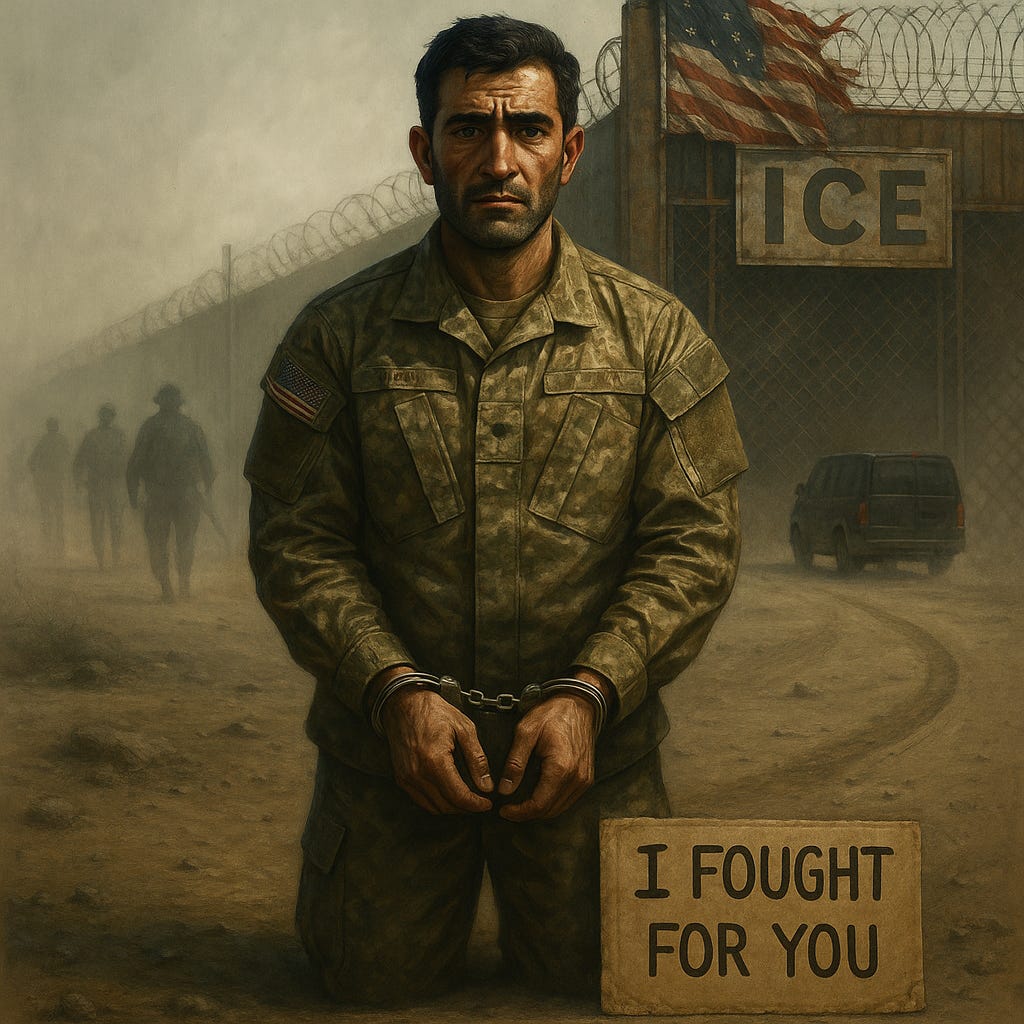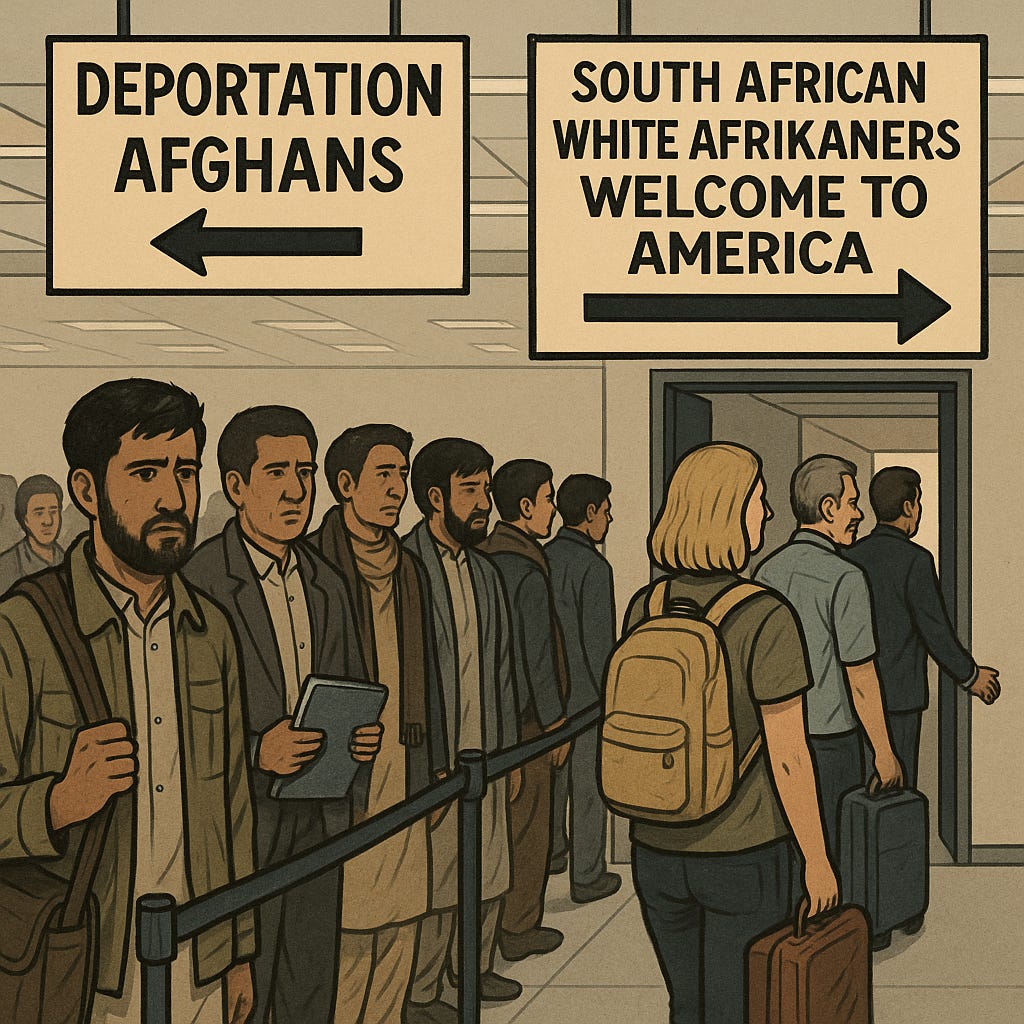No Friend Left Behind — Unless They’re Afghan
They Saved Americans. Now We’re Deporting Them to Die.
I worked in Afghanistan. I remember the bombings — citywide blasts outside cafes and hotels. It was dangerous to walk the streets wearing anything that marked you as American. But we weren’t alone.
Afghans stood beside us every day — drivers, security guards, fixers, translators.
They got us home safely. They stepped into buildings first, swept restaurants before we entered.
Their neighbors knew who they were. The Taliban knew who they were. They still showed up.
These weren’t just colleagues. I trusted some of them more than I’ve ever trusted Americans.
Their job was to protect — and they did it without hesitation. When we left, the very least we owed them was protection in return.
It’s not about politics. It’s about decency.
Whether they wore a uniform, a headscarf, or a humanitarian badge, they risked everything for us.
The most American thing we could’ve done was keep our word.
The Arrest of Sayed Naser
San Diego, June 11, 2025.
The interpreter’s name is Sayed Naser. He bled for the U.S. military in Afghanistan, walked beside American troops through ambushes, and followed every legal path the United States laid out for its allies.
That morning, he showed up at the federal building downtown for what should’ve been a routine asylum check-in — another step toward the protection he’d been promised.
Instead, U.S. Immigration and Customs Enforcement (ICE) agents in tactical gear marked “POLICE – ICE” were waiting. The arrest was methodical and silent. Within seconds, he was cuffed and marched away.
A bystander filmed it. The footage — grainy, brutal, unmistakably official — went viral within hours.
His wife, still in hiding, learned what happened not from ICE or his lawyer — but from a stranger’s phone screen. She had assumed he was safe.
Naser now sits in ICE custody at Otay Mesa Detention Center, a private federal jail outside San Diego.
He could be held for months while his case winds through immigration court — now in what’s called “defensive posture,” meaning the Department of Homeland Security (DHS) pulled it from the asylum office and placed it on an expedited deportation track.
The justification? That his case had been tossed on a technicality — bureaucratic jargon with no legal definition but catastrophic consequences.
If he loses, ICE may deport him to a third country — Brazil, Mexico, Qatar. Afghanistan is off the table. The Taliban would be waiting.
“He cannot believe this is happening to him,” said his lawyer, Michael McGoldrick.
“He fought with American troops. He wore their patches. Now they’ve disappeared him.”
This is not a border case. Naser didn’t sneak in. He didn’t lie. He has an active Special Immigrant Visa (SIV) file — meaning the U.S. already acknowledged his service.
But because he entered through the CBP One app — a digital workaround created during the evacuation — his military credentials weren’t formally processed at the border.
That clerical gap became the loophole ICE drove a prison van through.
ICE defended the arrest by telling Newsweek:
“There is nothing in his immigration records indicating he assisted the U.S. government in any capacity. All of his claims will be heard by an immigration judge.”
That’s a lie by omission. Naser submitted his proof — multiple times. The issue isn’t absence of evidence. It’s that he didn’t come through the right door.
In other words: he ran into a burning building to save America — but didn’t enter through the lobby.
“This man served with our troops,” said Navy veteran Shawn VanDiver.
“He followed every rule. And we locked him up anyway.”
He believed in the system. Treated the forms like scripture. Warned soldiers of ambushes in the dark.
Now he’s vanished into the legal machinery of the country he risked everything to protect.
To Trump’s DHS, Naser is just a case number — another Afghan dumped into a dragnet of travel bans, visa freezes, and executive orders designed to erase the protections wartime allies were once guaranteed.
“This case is the canary in the coal mine,” said Zia Ghafoori, head of the Interpreting Freedom Foundation.
“If they can disappear Naser, they can disappear any of us.”
Ghafoori isn’t speaking metaphorically. His phone rings day and night with panicked calls from interpreters, embassy workers, and commando vets — many now under ICE surveillance or preparing to flee again.
Some have already had their parole revoked. Others are preparing for arrest.
They were promised safety. What they got was a trap.
“They are sending us to death,” Naser told his lawyer.
“Is this how America rewards its friends?”
THE PROMISE
They Fought for Us. Now They’re Hunted Here.
The deportation dragnet has torn open wounds — not just for Afghan families now living in fear, but for the U.S. veterans who once swore they’d never leave their friends behind.
For Afghan evacuees, each day is a countdown.
A young mother, once an interpreter for U.S. forces, keeps a bag by the door and has trained her host family what to do with her toddler if she’s taken.
“I have nightmares about the Taliban catching me at the airport,” she told an advocacy group.
“If I’m deported, I die.”
A former embassy worker whispered through tears:
“Every knock on the door, I think it’s ICE. I can’t sleep.”
In Fremont, California, a community organizer put it bluntly:
“We thought we’d escaped the Taliban. Now we’re being tracked again — not by insurgents, but by the country we trusted most.”
The pain cuts both ways.
American veterans — the very people who made that promise of protection — are now watching the system betray their comrades.
Matt Zeller, an Army veteran whose Afghan interpreter once saved his life, issued a blunt warning:
“If they deport these men, veterans will block the buses themselves.”
That’s not rhetoric.
Grassroots veteran networks are already escorting Afghans to ICE check-ins. Some are organizing emergency sanctuary plans in case mass arrests begin.
Entire Army units have spoken out.
The 10th Mountain Division — a combat-tested force from the Afghan frontlines — published an open letter to the administration:
“You owe them your lives as much as we owe [our interpreter] ours.”
Retired generals have added their names to the call. So have thousands of enlisted veterans now confronting what they call a national betrayal.
Among the fiercest voices is Shawn VanDiver, founder of AfghanEvac and a Navy veteran:
“The Taliban doesn’t do performance reviews. They don’t check résumés. They kill people for being associated with us.”
When Rep. Brian Mast suggested that base workers — cooks, janitors — might be less deserving of protection than combat interpreters, veterans erupted.
VanDiver fired back:
“That’s morally bankrupt and strategically stupid.”
To the people who served, there is no hierarchy of risk — only one broken promise. They remember the oath. They made it. Now they’re watching it burn.
NO FRIEND LEFT BEHIND
When America Forgets Its Word, the World Remembers
This isn’t about immigration. It’s about betrayal.
The United States told men and women, “We’ll protect you,” then handed them back to the people they helped us fight. Afghan allies — interpreters, soldiers, embassy staff — are now being hunted. Not by the Taliban. By us.
Under the Trump administration’s 2025 directives, ICE has turned courthouses into ambush sites. Detentions spike during scheduled check-ins. Cases are terminated mid-hearing using vague labels like “improvidently issued” — procedural sabotage disguised as law.
Lawyers call it an administrative purge. Four major lawsuits are now pending — each trying to hold the line against a deportation machine targeting America’s wartime allies.
One challenge, CASA v. Noem, seeks to block the termination of Temporary Protected Status (TPS) for Afghans — which DHS announced not through legal notice, but through a press leak. The court will soon decide whether Afghanistan is “safe.”
Everyone else already knows it’s not.
Another suit attacks the use of expedited removal for Afghans with pending asylum claims — a clear due process violation. Others are preparing a class-action challenge over courthouse arrests, where DHS has reclassified cooperating migrants as fugitives overnight.
The stakes aren’t theoretical. Deportation could mean third-country exile, indefinite detention, or — for some — death. ICE is reportedly preparing flights to Brazil, Qatar, or Guantánamo. Others are being pressured into “voluntary” return, often under duress. None of this is lawful. All of it is happening.
And the consequences reach far beyond the courtroom.
Every interpreter in hiding. Every veteran mourning a broken promise. Every child sobbing into a phone begging not to be sent back.
They are the evidence. The warning.
While Afghan interpreters with SIVs are being jailed and fast‑tracked for deportation, the U.S. government — reportedly under pressure from Elon Musk and far‑right influencers — has already accepted the first group of white South Africans claiming “cultural persecution.” On May 11, 2025, 49 Afrikaner refugees arrived in the U.S. with expedited refugee status via Trump’s “Mission South Africa” initiative . Their vetting and resettlement happened in weeks, while processing for other refugee groups routinely takes 18–24 months.
These Afrikaners did not serve alongside U.S. forces. They aren’t in danger at the border of war, yet they were welcomed — quickly, quietly, and en masse — while Afghan wartime allies are being detained and deported.
It’s not immigration policy. It’s triage by skin color.
Because next time America goes to war — and there will be a next time — who will stand beside us? Who will risk their life for a country that cages its allies?
“We used to tell our interpreters that America keeps its word,” said one Army officer who served in Helmand.
“That’s what made us different from the Taliban.”
Then he paused.
“I can’t say that anymore. Not with a straight face.”
This is no longer a legal question. It’s a question of character.
Will we be the nation that leaves its allies in cages? That marches them back to the death squads they once helped us fight?
Or will we live up to the oath we made — to them, to ourselves, to history?
The veterans are watching. The children are watching. The world is watching.
One protester at a rally in D.C., a retired Marine in full dress blues, held up a cardboard sign with three words that still matter:







